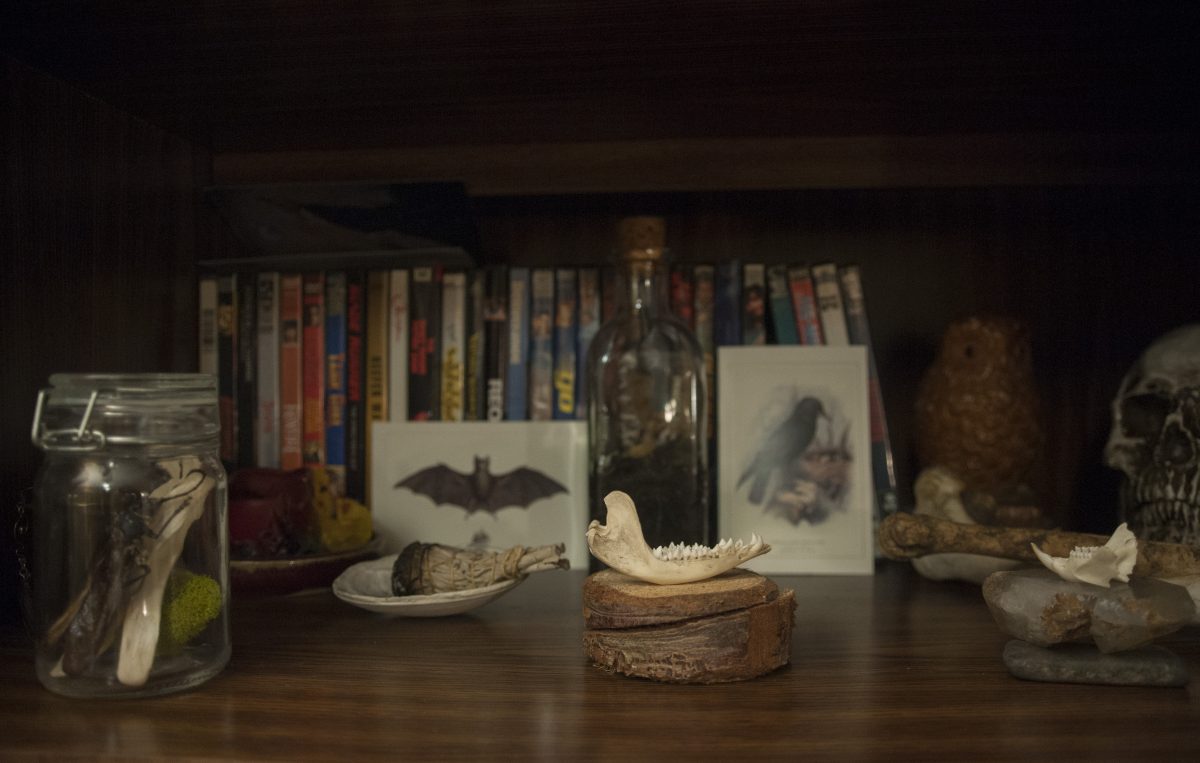Six women enter the room. They wear long brown coats, pink scarves around their heads and black sunglasses. White pearls line both their wrists and necks as they dance, followed by voices singing. The women come into formation, a line of six facing the crowd with their faces toward the sky. Slowly, they break into song and organized dance, stomping their feet, clapping their hands. The audience follows suit with shouts and applause, some women raising their pinkies in the air. This hand gesture is part of a special “call” ritual for members of this organization, Alpha Kappa Alpha at the University of Oregon, a historically African American sorority. It’s their historic sign of pride and recognition. The six women then take off their scarves and sunglasses, one by one revealing themselves as new members of AKA. They sing about why they’re AKA’s, reciting quick facts in a song-like fashion about the origin of their sorority and its founding sisters. As they close out their dance, older members from different chapters and active members step forward from the audience, forming a circle around the six women, holding hands and joyously singing about Alpha Kappa Alpha. The ceremony ends with the women embracing one another, smiles on every face, including the spectators.
Alpha Kappa Alpha is part of the growing movement for multicultural and minoritized organizations within Greek life at the UO. AKA is in the National Pan-Hellenic Council which is composed of nine national African American sororities and fraternities, known as the Divine Nine. NPHC is different from the Panhellenic Council and the Interfraternity Council which oversee Greek organizations that are not associated with multiculturalism or a minority identity. Along with the push for bringing back the Divine Nine, other multicultural and minoritized Greek organizations have begun to gain traction at the UO.
The Divine Nine
Nicole Dodier, the former co- director of the Black Student Union and a member of the Black Student Task Force, has recently become a new member of Alpha Kappa Alpha Sorority Inc., a joint chapter between the University of Oregon and Oregon State University.
“Growing up in the black community, it’s a very high honor to be a part of Greek life and it’s very special,” Dodier says. “My personal morals and values align very well with Alpha Kappa Alpha in terms of the importance of education and the way that the members of this organization represent themselves and the way that they carry themselves is something that I aspire to have.” Ever since she was a child, she has looked up to these women as leaders.
One of AKA’s purposes is to encourage high scholastic standards. “Encouraging women to be successful in their education and to strive for greatness,” Dodier says. Another important purpose of their organization is to bring women together, for them to network and connect. Also, to promote community and friendship among college women. Dodier says she gained a community and support system from AKA.
Dodier says that there is a focus on the African American community to fully encourage each other to have more opportunities. “Since we are a disadvantaged group in the United States, these organizations are a place where you can have that extra support, that extra backbone, that extra network to help you advance yourself throughout life,” she says.
Self Starter
Hector Gonzales, a senior at UO who was born in Mexico and raised in Arizona, is the president of Sigma Lambda Beta, a Latino- based fraternity with multicultural membership. Sigma Lambda Beta is the only multicultural Greek chapter on the UO campus and became active in the spring of 2016. Currently, it has eight active members. Gonzales first became a fraternity brother at Arizona State University his freshman year, then decided to transfer to UO his sophomore year. By the end of his first year here, Gonzales had worked hard to establish the Sigma Lambda Beta Chapter at UO.
“Most minorities can’t see themselves identifying with the Greek organizations because of certain stigmas,” Gonzales says. “It makes people very cautious to join multicultural Greeks.”
Gonzales knows that there is work to do to combat the stereotypes of Greek life. Stereotypes can present an obstacle for multicultural organizations to grow and gain membership. Gonzales points out that when most people hear of a professional Greek service organization, they think of the mainstream, traditional Greeks in IFC and PHC, which involves 18.25 percent of the student population at UO.
Sigma Lambda Beta is involved with a doctoral research project called Allas with the Department of Counseling Psychology at UO. This project involves them mentoring students at Springfield High School that are from Latin America or are transitioning from different countries to the States. Every Tuesday and Thursday, one can find the brothers of Sigma Lambda Beta giving advice and providing support for these students, whether it be through academic tutoring, practicing English or putting on cultural awareness presentations to help them understand their surroundings.
Finding Roots
Montana Thorner, the chapter president of the local Jewish sorority Sigma Mu Omega, says she initially felt apprehensive about rushing a sorority.
“I felt that the national houses were just too intimidating, I just didn’t find what I fit into,” she says.
According to Thorner, multicultural Greeks and groups operating outside of the PHC and IFC can provide a less high-strung, more relaxed environment for potential new members. Traditional fraternities and sororities can sometimes have up to 200 members, which can be overwhelming. Lower membership numbers, like the 13 women in Sigma Mu Omega, allow for tighter-knit relationships and communities.
Thorner felt that as an introvert, the informal recruitment process of Sigma Mu Omega was a better environment for her compared to the hectic nature of formal recruitment within the PHC.. The organization put on informal events throughout the week, such as pizza parties, where Thorner was able to talk to every member of the sorority, which led to her feeling comfortable and at home. The formal process, interactions, and people can seem surface-level, difficult to fully get to know what a certain chapter is about. During formal recruitment, conversations can be short and rushed amidst the loud chatter of the other girls talking.
Thorner enjoyed the idea that while they engaged in everything that the other chapters did, such as sisterhood, social engagement, and community service, they were built on another pillar—the incorporation of Jewish values. She had always wanted to get more in touch with her Jewish roots and culture, as her father is Jewish but didn’t fully implement the Jewish culture into their family.
A Push From Administration
Marcus Langford, the Assistant Dean of Students for Leadership and Engagement, talks about his own experience as a brother in Alpha Phi Alpha, an African American fraternity also part of the Divine Nine. Langford went to Miami University, a predominantly white institution. Today, he is still close to his fraternity brothers. They have all gone to each other’s weddings. They keep in touch with each other as well as with some active brothers there now. As someone who has been a part of a fraternity created by and for minorities, he understands the impact and goal behind such organizations.
Langford says that multicultural Greek organizations are beneficial because they provide students with “a sense of belonging, with a network of support.” Langford says that “they are an opportunity for students to have an experience with individuals they identify with and who have shared value systems.”
Culturally Aware
Multicultural Greek organizations are also different from the traditional ones in that they heavily promote cultural awareness. According to the Health Education and Training Institute, cultural awareness is a sensitivity to the differences and similarities that exist between two different cultures, as well as using the sensitivity to effectively communicate between the different cultural groups. While the traditional Greek organizations have philanthropies—charitable causes which a chapter supports—their presence in the community predominantly consists of social events with other Greek organizations, reinforcing their existence within a Greek bubble.
While there are still resounding undertones of brotherhood and sisterhood throughout the multicultural organizations, Caitlin Roberts, the director of Fraternity and Sorority Life, says that there is usually more emphasis on service and giving back to the community. Sigma Lambda Beta doesn’t have one set organization that they support like the traditionals. Instead, they commit their time and resources to whichever organization is needing it, while promoting cultural awareness at the same time.
“We are very heavily concerned and involved with our community,” Gonzales says. “We strive to bring equality and inclusivity.”
Sigma Lambda Beta has fundraising events for a variety of different organizations. Last year, they helped support an independent nonprofit organization in Haiti, called Community2Community, whose main goal is to rebuild infrastructure, schools and water systems. The fraternity put on a cultural awareness event where they taught people how to make hope bracelets out of Haiti’s national colors. After making the bracelets, Sigma Lambda Beta gave a presentation on Haiti’s culture and spoke about the issues that they were facing as a nation. On top of bringing cultural awareness to the forefront, Gonzales’s fraternity also works year round with Central Latino America, which is a bilingual, multicultural organization that serves Latino families in the Lane community. There, they provide help and resources by mentoring at-risk youth and showing them positivity in their community.
Looking Ahead
Talk of a new council has begun, led by both Sigma Lambda Beta and Sigma Mu Omega. In the spring of 2017, Sigma Mu Omega made the decision to leave the PHC. Thorner says that with the differences between their sorority and the mainstream, traditional Greeks, it just didn’t make sense for them to continue with the community in the PHC. They had similar values to the traditional organizations and did many of the same things, but they were ultimately different in how they operated. They were more focused on community engagement than wider social engagement.
They want to try something new, to branch out. Thorner speaks of the new council as being a place for diversity and multiculturalism, for expanding the community that has begun to sprout here in Oregon. Roberts says that this new council would work to serve the needs of the members of the organizations that belong to it, and the four councils (PHC, IFC, NPHC, and the new MGC) would work together to build a community on campus. The multicultural organizations need a community in order to operate efficiently and socially. All would come together for leadership training, programming and honor societies. Gonzales is also a supporter of creating an MGC, but says that there would need to be more multicultural organizations on campus before that can happen.
Both Thorner and Gonzales have high hopes of the new councilas being a welcoming place where people, from diverse backgrounds or cultures, are able to connect and grow together.



![Generations of handmade Native American regalia and decor fill the walls of Crystal Szczepanski’s home on the Confederated Tribes of Grand Ronde reservation. Among them hangs a Pendleton and leather cradleboard crafted by relatives for Szczepanski after the birth of her daughter, Ravin. A carving of a wood canoe is […]](https://ethos.dailyemerald.com/wp-content/uploads/2018/04/b4d48e73893ec02eabc7a89b5591d678-800x1200.jpg)
![Words and Photos by Sarah Northrop Dark rooms, dark skies: Behind black curtains, a metal basin sits among scattered jugs of chemicals, a row of enlargers and mismatched development supplies. On the outside of the darkened space, a red warning light switches on. There’s a darkroom in use. And I’m […]](https://ethos.dailyemerald.com/wp-content/uploads/2018/04/a88cc0af91f19341e0e8afe516d39192.jpg)


![Before dinner, Paige gives James his medicine in the form of a cannabis oil filled capsule. James takes about 45mg of CBD and THC/THCA oil throughout the day. The CBD helps reduce his seizures while the THC and THCA helps regulate his emotions and impulse control. “He is more able […]](https://ethos.dailyemerald.com/wp-content/uploads/2018/01/d78a0fd1da4fdc3992cdea4aebdc20db-1200x800.jpg)


![[Photo Courtesy of the Lara Family]
Ruben embraces his beloved childhood goat, Katrina.](https://ethos.dailyemerald.com/wp-content/uploads/2025/05/katrina-1-1060x1200.jpg)


